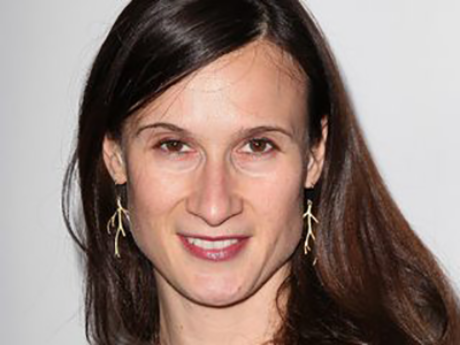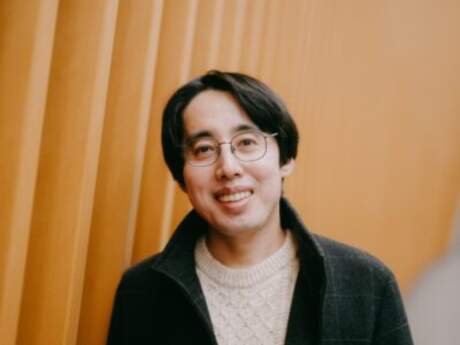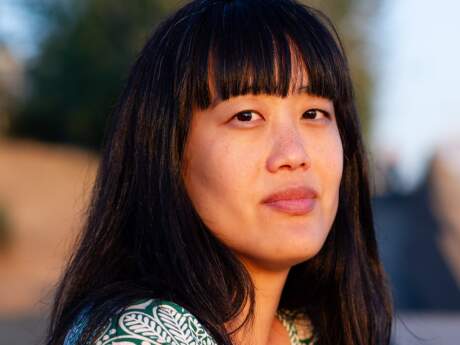In Their Own Words
Cynthia Lowen's “Hibakusha”

Hibakusha
I never knew how to become what you loved.
I loved that dress, and now I wear it on my skin
forever. I had forgotten the war,
though I was still wearing the dress
I wore to school that day. I seeded
a garden. I was not a victim. I licked rice from my fingers
and watched koi kiss the surface of the pond.
The garden pushed up against my dress.
My dress was filled with wildflowers,
I thought. I forgot where I'd planted the seeds
until they bloomed. They were called
disgrace. We were not victims. I forgot the war.
From The Cloud That Contained the Lightning (University of Georgia Press, 2013). Reprinted with the permission of the author.
On "Hibakusha"
This poem is one of three in The Cloud That Contained the Lightning that share the title "Hibakusha," which is a Japanese word translating to explosion-affected people. It is used in Japan to refer to the survivors of the atomic bombings of Hiroshima and Nagasaki. I began this series of poems later into my writing of this collection, which centers around J. Robert Oppenheimer, known as the father of the atomic bomb. I was drawn to this topic by virtue of the fact my grandfather was a physicist on the Manhattan Project, and though I never met him, I grew up wondering, what could have compelled people to create this terrible weapon?
As Oppenheimer emerged in these poems as an answer to that question—a man motivated by hubris and curiosity and the pressures of war—I knew I didn't want to pardon his participation in the bomb's creation for being merely a product of his time. I wanted to hold Oppenheimer accountable for the tragedies his work (and that of thousands of others) wrought on innocent civilians in Japan. As a result, the Oppenheimer who appears in these poems is also a man incapable of meaningful connection with his fellow humans, a man who is filled with prejudice, a man who deludes himself about his own motives, a man who is capable of cruelty, and for all his brilliance, a man who is willfully ignorant of the human stakes at play.
In order to counterbalance Oppenheimer's failure to see the targets of the bombings as anything other than abstractions, I wanted to give voice to these people and to make them real in way they were not to the Manhattan Project scientists, or to the military strategists who decided to employ the atomic bomb. And so I began researching first-hand accounts of the hibakusha who had survived to tell the world what had happened at Hiroshima and Nagasaki. (The Peace Memorial Museum in Hiroshima has done an incredible job of archiving the testimonies of survivors; the online database can be found here.) Out of these accounts came the hibakusha poems.
This particular poem—in the voice of a young woman who sustained flash-burns in the bombing as a teenager and later develops cancer—reflects some of the most unexpected things I learned in my research. One is that the hibakusha were discriminated against within Japan for being reminders of Japan's loss of the war: they often had difficulty finding jobs or getting married, people feared the hibakusha could spread radiation sickness, and depending on the extent of their physical injuries, many hibakusha were hidden away and isolated in family homes. Unlike in the United States, where I suspect they might have been honored as war heroes, the hibakusha were symbols of shame, revealing profound differences in how cultures absorb and process such tragedies.
One of the other things I discovered, and which the poem refers to, is that it was illegal during the post-war reconstruction period and Allied occupation of Japan to write or report on the bombings (this censorship lasted until the mid-1950s), and so the hibakusha were not well informed about the health impacts of radiation exposure. Although many women in Hiroshima and Nagasaki gave birth to infants with defects, they were told by their doctors that it was unrelated to the bombings. The elevated risks of cancers and other health problems associated with proximity to the epicenter were also largely kept from the public. Looking forward, it's easy to understand the Japanese people's wariness about the effects of the radioactive leaks at the Fukushima Daiichi Nuclear Power Station, and the fear the government is not revealing the full scope of the disaster.
The last thing this poem addresses is the shear power of this weapon and why it should be eliminated from global arsenals for its inability to discriminate between military targets and civilians. (According to the Federation of American Scientists, there are approximately 20,000 nuclear warheads in the world's combined stockpiles today, while 2,000 belonging to the U.S. and Russia are believed to be ready for use on short notice). The heat at the epicenter of the explosion exceeded four thousand degrees Celsius and the light from the flash was so bright it burned through anything that would absorb it, including clothing. The dark spots absorbed the light while the white areas reflected it, and so the burns people sustained on their flesh corresponded to the patterns on the clothing they were wearing at the moment the bomb went off.
In juxtaposing the poems from Oppenheimer's perspective with those poems in the collection from the perspective of the hibakusha, it's my hope that The Cloud That Contained the Lightning creates a dialogue that speaks to the opportunity for compassion and understanding, not only as we look to history, but as we grapple with the conflicts we face today—as well as those the future holds.


